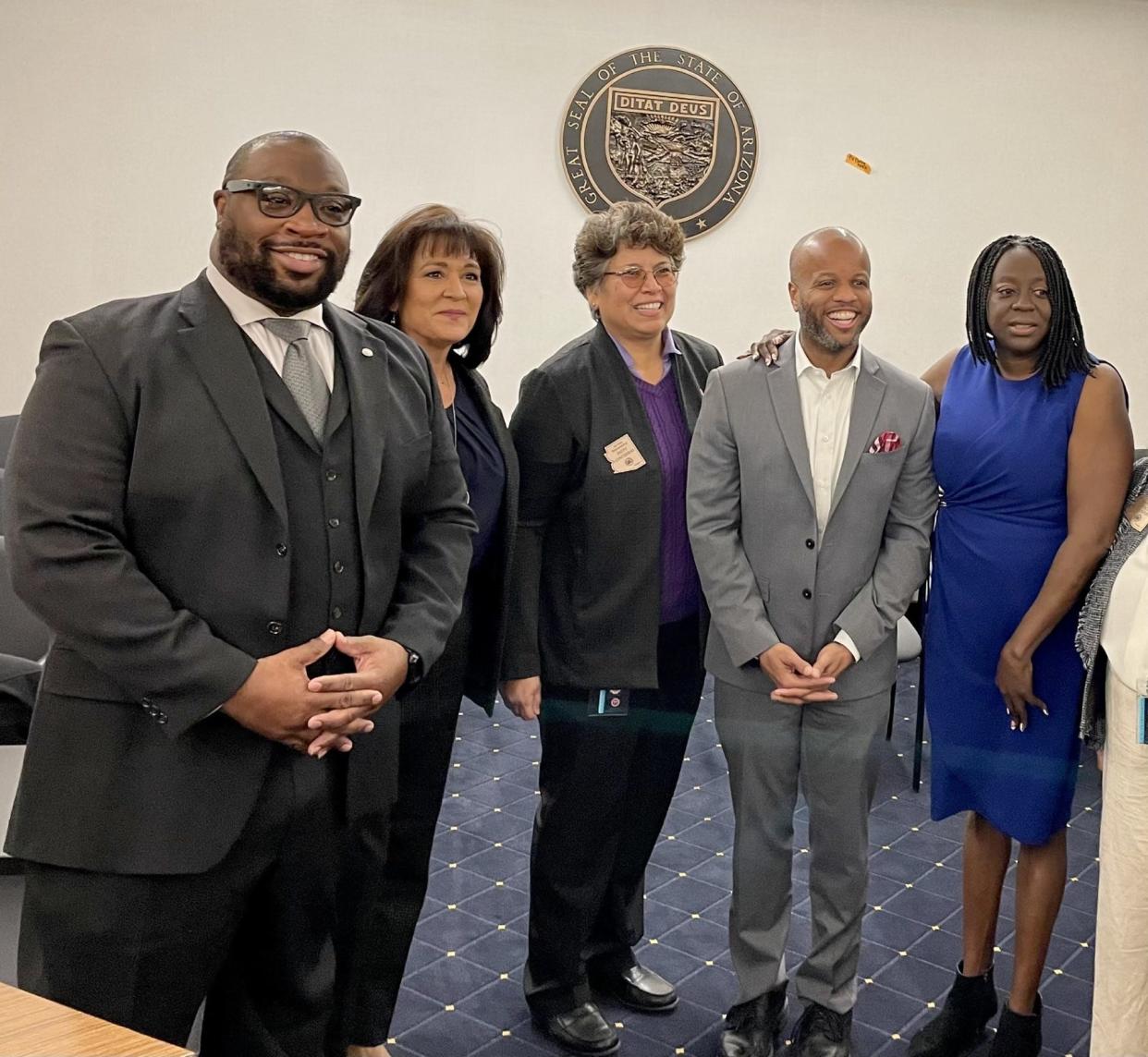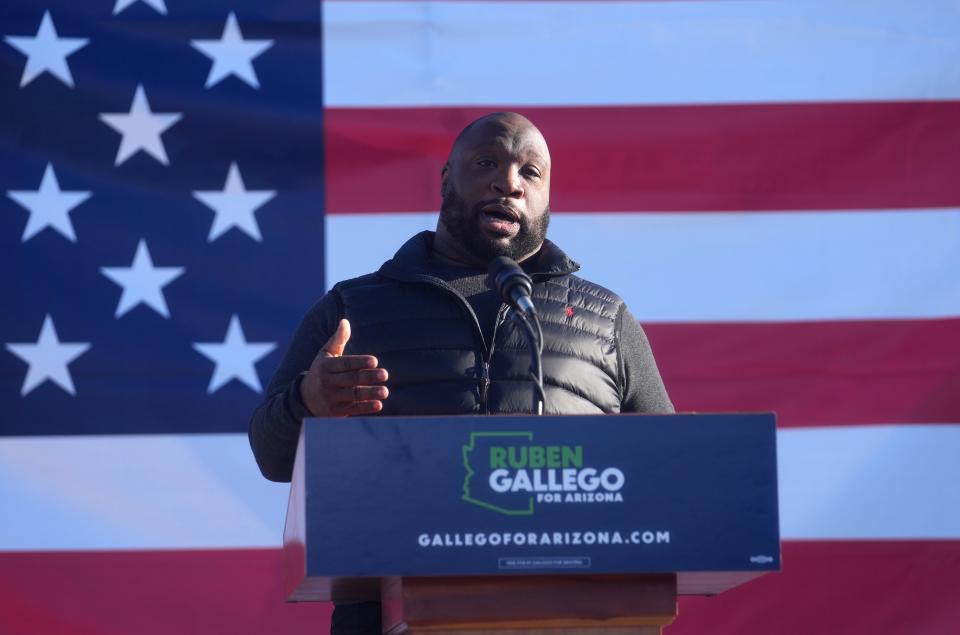Audit raises red flags: Tempe paid contractor $9K per month without proof of work

A prominent figure in Arizona's progressive political scene and longtime friend of elected officials in Tempe received more than $70,000 from the city, even though an audit from September couldn't find documented proof that he actually did the work he was hired for.
Tempe made the payments as part of a no-compete contract that ran from November through June. On average, the contractor raked in about $9,000 worth of public funds every month during that period.
The city audit doesn't say the consultant failed to work the hours he was paid for, however. The contractor himself said he "absolutely" did, and every city source who spoke with The Arizona Republic believes him. There just isn't documented evidence for that one way or another.
And that's because the city never asked for proof of his work. The internal review also found Tempe broke its own rules by awarding the contract without a competitive process and paid out nearly $10,000 more than the contract maximum — including thousands for out-of-state travel that wasn't within the scope of the agreement.
The contractor is Roy Tatem Jr., the former head of the East Valley NAACP. He worked on Bernie Sanders' 2016 presidential campaign, was a speaker at the inaugural rally for Ruben Gallego's U.S. Senate bid in January, and considers himself a friend of Mayor Corey Woods and Councilmember Berdetta Hodge.

Former City Manager Andrew Ching first met with Tatem to discuss a contract arrangement last year after Woods, Hodge and the current City Manager Rosa Inchausti suggested finding a role for him. In November, Ching hired Tatem as a consultant to conduct outreach to minority groups and help them engage with city government.
By all accounts, Tatem did solid work over the next eight months. Tempe even renewed his contract in June and offered him a Police Department job, right before slamming the brakes soon after The Arizona Republic requested a copy of his contract in July.
By mid-August, his six-month contract was terminated early, and the job offer revoked.
But nothing suggests Tatem was at fault for the abrupt ousting. Ching, Tatem's supervisor, believes he worked every hour he billed the city for. And City Spokesperson Kris Baxter-Ging wrote that there is "no question (Tatem) spent hundreds of hours working to improve the ways the City of Tempe engages with residents."
The shortcomings identified in the audit point to Tempe, raising questions about how the city did business. Specifically, the internal review found that Tempe:
Paid for 1,139 work hours without knowing what was done. Tatem's invoices just listed the number of hours he claimed each month multiplied by his hourly rate of $60. There was no explanation of what he did during those hours, but the city signed off every time.
Did not ask for proof of work. The contract had "no specific completion milestones" and did not require Tatem to document his work. Ching was Tatem's supervisor and also did not ask for such records. That made it impossible for the city to determine whether Tatem's services "met contract requirements."
Spent $3,500 to cover out-of-state trips. Tatem traveled to Cleveland and Detroit for National Organization of Black Law Enforcement Executives events. Ching allowed Tatem to be reimbursed for that and also paid him $7,300 for the time he spent traveling and attending the events. Travel costs weren't included in his contract.
Paid Tatem $10,000 more than the contract cap. Tempe was only allowed to pay Tatem $62,500, per the initial contract. He was set to exceed that cap in June, so the city just bumped up his maximum pay without any formal contract tweaks. In addition to travel costs, he ultimately received about $72,000 over eight months.
Broke city rules on no-compete contracts. Most city contracts must go through a process where firms can bid on the job, but some can skip that step if they are "council initiated." Tempe's lawyers permitted Tatem's no-compete contract for that reason, but the audit found that the City Council did not "officially" initiate it.
Ignored insurance rules. Before the city can award a contract, contractors are required to get insurance that protects them and the city in the event that a contractor gets hurt, hurts someone else or damages property. Tatem never got that coverage, and Tempe's procurement staffers never noticed.
Details about what prompted the audit are murky. A city statement indicated Inchausti's office first reviewed the contract when she took over as City Manager in late June. She became "aware of the lack of clearly defined deliverables" and that "material changes" like the pay increase were made off-the-cuff, the city said.
She then asked the City Auditor to look into the agreement on Aug. 2, two weeks after The Republic requested a copy of the agreement. That records request was fulfilled just a couple of days before Tatem's contract was canceled on Aug. 16.
Tatem remains steadfast that he did nothing improper and that he followed through on his contractual duties. He cited his work helping Tempe police craft hate crime protocols, organizing the city's Juneteenth celebration and creating the city's podcast called "Tempe this Week."
He also submitted an overview of his work to the City Auditor, but the after-the-fact synopsis was not enough to "conclusively determine" whether Tatem had done what he was supposed to because it didn't include documents from his time working with the city.
Also, Tatem contends the travel costs were "directly in relation to my work with the city," which often involved working with police. In one instance, he helped officers intervene when a bomb threat was called into Brick Road Coffee's drag storytelling event in February.
"I don't want my professionalism and my credentials questioned because I went through every process the city presented to me," he said. "I took pride in my work, and I did exceed the expectations. I take pride in that."
In a statement to The Republic, the city said it parted ways with Tatem because of issues with the contract language, as well as reorganization efforts by the new city manager. Tatem's job offer with the Police Department was rescinded by the new chief, Ken McCoy, for similar reorganization reasons, Tempe's statement said.
It remains unclear why the city cut ties with Tatem rather than re-write his contract, if officials found nothing wrong with, and indeed, praised his work.
Inchausti, whose office fired Tatem, had suggested he continue his work as a regular city employee a month before his ousting.
Tempe said it has since made changes to its contract process in order to stave off similar issues in the future. Those tweaks include outlining what proof of work is required. Baxter-Ging told The Republic that staffers are reviewing city policies to see if any other changes are needed.
"The City Attorney’s Office and Procurement Office are working together to see if refinements are needed to our contract procedures and standards," she wrote in an email. "This will ensure that all contracts have clear deliverables and that they have completed the appropriate approval processes."
Who played what role in the contract chaos?
Tatem's contract is the second Tempe agreement to draw scrutiny this month. And just like the other one, which recently prompted a state investigation into whether Tempe broke at least two Arizona laws, no one Tempe staffer or department is wholly responsible for the issues that have come to light with Tatem's deal.
City records and interviews suggest there were breakdowns throughout Tempe's contract process, and that multiple officials and staffers had a hand in creating the situation.
Here's a rundown of the role played by each key player:
Former City Manager Andrew Ching

Ching was the one who wrote, approved and renewed the agreement with Tatem because contracts under $100,000 don't have to get City Council approval. The audit cites "ambiguity" in the contract language as the reason Tatem did not document his work or have specific performance benchmarks.
As Tatem's supervisor, Ching also approved the travel expenses, pay increase and billed hours. Ching said he did not ask Tatem to include work details in invoices because it's not required of typical staffers and Tatem was treated "much like a regular city employee," with an office at City Hall where the consultant worked "on a daily basis."
"(Tatem) kept me apprised of his activities on a regular basis," Ching wrote in a statement to The Republic. "Based on our conversations and my observations, (his invoices) were consistent with the times I observed him in City Hall and the type of work he informed me he was doing."
City Attorney Sonia Blain's office
The City Attorney's office reviewed Tatem's contract and decided it was exempt from Tempe's competitive process rules because the City Council initiated it. But was not the case, and the contract clearly says Tatem would be reporting to Ching, not the elected officials.
"We discovered no evidence to suggest that the council officially initiated this contract," the audit reads. "In fact, the contract explicitly specifies, '"consultant will work directly with and for the city manager or his designee as an independent consultant.'"
Tempe's Procurement Office
Procurement staffers handle contract logistics, such as issuing "award notices" to companies that enter into agreements with the city. Staffers there aren't supposed to issue those documents until contractors prove they have the required car and general liability insurance.
In Tatem's case, they handed over his contract even though he didn't have that insurance coverage throughout his time working for Tempe. It's unclear why the Procurement Office did not follow that policy for Tatem.
The Contractor, Roy Tatem

Tatem was only directly responsible for one shortcoming outlined in the audit: his failure to get insurance. He skirted that rule because "his attorney believed that the mandated coverage areas did not" apply to his services, but ended up getting insurance the day he was fired, according to Tempe's internal review.
Mayor Corey Woods and Councilmember Berdetta Hodge
Woods and Hodge helped Tatem get his contract, according to Ching. He said "the initial impetus to consider retaining Mr. Tatem's services came about" after conversations with those two. That happened shortly after Tatem was passed over for Tempe's Chief Diversity Officer position.
Tatem has been friends with both Woods and Hodge for years. The city did not directly address whether that played a decisive role in his hiring, but Ching made clear that he never felt pressured to get Tatem on the payroll and that neither official "directed his hiring."
The former city manager added that Woods and Hodge's suggestion that Tatem's services could be of use "had merit." He said that, based on that recommendation and Tatem's performance during the earlier job interview, Ching "met with him to discuss what a possible engagement for his services could look like."
City Manager Rosa Inchausti

Inchausti was involved both at the very beginning and end of the contract saga. Like Woods and Hodge, she suggested Ching find a job in the city for Tatem last year. And it was her office that initiated the audit and ultimately fired Tatem in August.
Shortly after she was appointed City Manager June 27 and only a few weeks before cutting him loose, Inchausti also recommended that Tatem apply for a "temporary community affairs position" in the Police Department, according to the consultant. The position would have made him a full-fledged city employee.
"She invited me to her office to talk about what was next for me," Tatem explained. "She said that based on the work I had been doing with the police ... she felt I could help (Chief McCoy) become engaged and acquainted with the community."
Lingering questions
There are inconsistencies between what city leaders said about Tatem and their actions to remove him, which have yet to be fully explained.
Tempe had even publicly announced that Tatem would transition to the police department before that offer was rescinded by Chief McCoy. The police role had just been created but was eliminated after Tatem was sacked, raising questions about whether it was needed at all.
Tempe wrote in an email that Inchausti and McCoy — who also stepped into his current role in June — had reconsidered whether Tatem's previously lauded services were worth it.
"(Both Inchausti and McCoy) have as a top priority looking with fresh eyes at the way Tempe deploys its resources," the statement read. "This reconsideration, coupled with the contract issues, made ending the engagement with (Tatem) the best course of action."
Even Tatem himself was caught off guard. He had no indication that things were going south until the day he was fired.
He said McCoy met with him in early August and said Tatem would be "perfect for this role externally" but not inside the department "based on feedback that he received" from his staff.
Tatem's contract ended during a similar meeting with Deputy City Manager Greg Ruiz, who told the consultant "we just don't like the way the contract is worded."
"I thought everything was going well. It came as a surprise to me that the police position was rescinded and then the contract was terminated. I was like, 'am I being pushed out for something?'" He said. "No one said they were upset with my performance or with what was being done. No one ever expressed anything like that to me."
This article originally appeared on Arizona Republic: Tempe paid consultant $70K, renewed contract without proof of work

